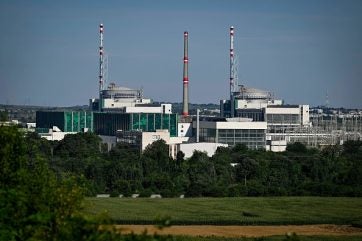
Bulgarian nuclear analysts have questioned the viability of the country’s plan to build two US nuclear reactors at the Kozloduy NPP, highlighting funding issues and concerns related to the cost of energy from the plants.
Valentin Kolev, energy analyst and member of the American Association of Energy Engineers, told Euractiv: “It will be very difficult to find banks to finance the project. If we assume that we will produce 15 terawatt-hours per year, in 20 years of operation, it makes 300 terawatt-hours. At a price of €17.6 billion for the two reactors, a price of close to €60/MWh [megawatt-hour] would result, but this is only the investment. Fuel costs and much more are not included. The price cannot be below €100–125.”
Bulgaria’s Minister of Energy, Rumen Radev, has said that the electricity from the new Kozloduy reactors will cost €65/MWh.
At the beginning of February, five companies submitted applications to build the two Westinghouse AP1000 reactor units at Kozloduy. South Korea’s Hyundai Engineering & Construction was eventually selected to carry out construction of units 7 and 8 at the plant.
While Radev claimed the reactors will cost €13bn ($14.13bn), nuclear analysts state that costs could be far higher. Energy analyst Georgi Stefanov, formerly the Head of the Political Cabinet of the Deputy Prime Minister for Climate Policies in Bulgaria, expressed fear that billions of euros worth of the state budget could be wasted.
“The construction of a power plant should be looked at like this: how much money do we need, how much money will we earn, and then how much money will we pay for the disposal when the NPP is closed, and for the maintenance of the nuclear waste?” he said.
During negotiations with the EU in 2007, Bulgaria agreed to close Kozloduy units 1–4, which were Soviet era VVER-440 models, after the European Commission classified them as non-upgradeable. Units 5 and 6 have VVER-1000 reactors that were connected to the grid in 1987 and 1991, respectively. Both units will operate for a further 30–60 years, having undergone refurbishment and life extension programmes.
The country’s Council of Ministers gave approval for the new Westinghouse AP1000 units at Kozloduy last October. The target for the completion of the first units is 2033. The 2.3GW capacity of the two new units will exceed the 1.7GW capacity of the closed four units. By 2050, further units will be needed to replace 5 and 6.



